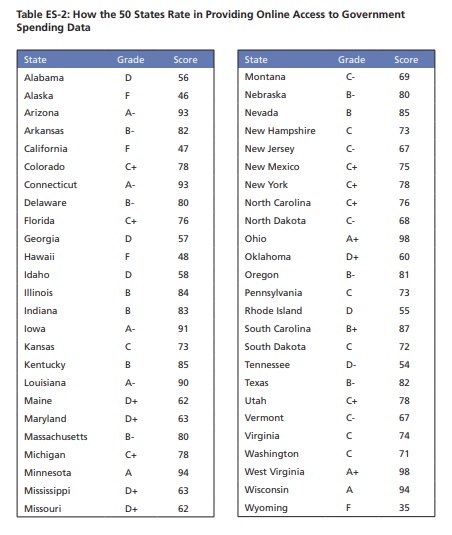Deirdre Cummings
Legislative Director, MASSPIRG
617-747-4319
[email protected]
Legislative Director, MASSPIRG
617-747-4319
[email protected]
NEW REPORT:
Massachusetts Receives “B-” in Report on Government Spending Website
Massachusetts received a “B-” for its government spending transparency website, according to “Following the Money 2018: How the 50 States Rate in Providing Online Access to Government Spending Data,” the eighth report of its kind by the Massachusetts Public Interest Research Group (MASSPIRG) Education Fund and Frontier Group.
The report graded each state’s transparency website from “A” to “F” based on its content and user-friendliness. This year, for the first time, we worked with focus groups to see how well the ordinary Americans could navigate the sites. With that new standard, most states’ grades dropped from our previous report.
Last year, Massachusetts received an A. In fact, Massachusetts first earned a grade of “F” in our first report released in 2010. Soon after, the legislature passed a comprehensive state spending transparency website law, spearheaded by Rep. Jay Kaufman (Lexington), Rep. Antonio Cabral (New Bedford) and Senator Cynthia Creem (Newton).
“When states are transparent about how they spend tax dollars, we all win: the state saves money, it can operate more efficiently and effectively, and citizens can feel more confident in their government,” said Deirdre Cummings with MASSPIRG. “Massachusetts has for many years lead the country in making their state spending data available online. However, as technology and information improve so do our expectations, and the website evaluations get more difficult. It’s time for Massachusetts to once again invest in meaningful, accessible, comprehensive disclosure of the state’s spending data. They need to move from their “B-“
back to the “A” and “A-“ they earned each year since 2012.
Massachusetts qualifies as an “advancing” state. Massachusetts’ transparency site called CTHRU offers improved functionality and user-friendliness that makes searching for specific expenditures much easier. However, the state still fails to provide comprehensive spending information for its economic development subsidy programs. In particula, Massachusetts should focus on providing recipient-level projected and actual public benefits for each of its programs, include all of the spending information from all the quasi-public agencies and improve some of the real-world search functions.
The report found that many states’ websites lack features that make them intuitive for users, such as a full search function, standardized data descriptions and interactive tools.
“These sites can often be confusing for citizen users. Our focus groups put transparency websites to the test and found only a handful meet the expectations of a 21st century user,” said Rachel J. Cross, a Frontier Group analyst and report co-author.
To visit Massachusetts transparency website, click here.
To read the full report: here.

# # #
The Massachusetts Public Interest Research Group Education Fund works to protect consumers and promote good government. We investigate problems, craft solutions, educate the public, and offer meaningful opportunities for civic participation. If you wish to stop receiving these mailings, please reply with the word “unsubscribe.”